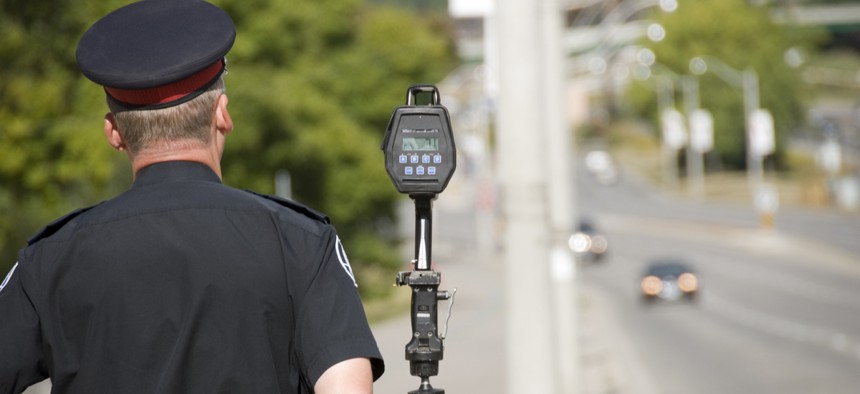These Police Can't Use Radar and Changing That Could Be an Uphill Battle

Similar bills have passed the Senate in recent years but languished before House committees. Shutterstock

Connecting state and local government leaders
Pennsylvania is the only state in the country where local police departments can't use speed-detecting radar. Multiple bills aim to give them access.
In Pennsylvania, local police officers carry firearms but aren’t allowed to use radar guns. Lawmakers there are trying to change that, despite repeated failures in recent years.
“For the past three or four legislative sessions we’ve been trying to get it going,” said Joe Regan, chairman of the legislative committee for the Pennsylvania Fraternal Order of Police. “Last year was the closest we got. At the end, it just seems like the legislators aren’t interested in bringing it up, and it peters out.”
The local radar ban—the only one in the country—has been in place since 1961, when state police in Pennsylvania first began using the devices. The exclusion came largely from fears that small-town police departments would use radar to set up speed traps to drum up additional revenue. Money is still a sticking point for supporters of the ban, who say that radar is prone to errors that can cause drivers to get speeding tickets they don’t deserve.
“RADAR should be banned in Pennsylvania and not extended to municipal police,” Tom McCarey, a member of the state chapter of the National Motorists Association, wrote in an April op-ed for PennLive. “There is no epidemic crisis of speeding, only an epidemic crisis of highway engineering malpractice allowing well meaning but misinformed politicians to seek more and more money from safe drivers.”
But proponents of the measure say it’s simply about safety—for drivers and residents, but also for police officers on the road.
“It’s not about the revenue,” Regan said. “It’s about the safety of the officers, and it’s about using a tool that’s accurate.”
Kept from using radar guns, local police in Pennsylvania rely mainly on stopwatches and a laser timing system known as ENRADD. Both are functional, Regan said, but radar is more accurate and safer to deploy in heavily trafficked areas because it does not require an officer to exit the patrol car.
State lawmakers have introduced legislation to reverse the radar ban in at least two recent legislative sessions. Both bills passed the Senate and then languished before a House committee, ultimately dying due to lack of action before the conclusion of the session.
This year’s iteration, sponsored by state Sen. Mario Scavello, passed the Senate 49-1 last month. As written, the bill requires municipalities to adopt an ordinance authorizing the use of radar by their police departments, establishes training standards, and caps the amount of money that a city, town or county can keep from fines generated by speeding tickets (20 percent of the overall budget).
Scavello, a Republican, told The Morning Call he would spend the summer contacting his colleagues in the House to give the bill a better chance of passing.
His is one of several radar proposals making its way through the legislature, including a House bill that would establish a six-year pilot program for accredited local and municipal police departments.
Because of the multiple proposals, and the amount of time left before the legislature adjourns in December, Regan said he’s confident that some form of a radar bill will pass this time.
“We’ve been asking about this for many years, and I just tell our active police officers to tell their legislators that it’s important,” he said. “The good part about this is that it’s early in the session now, so we’re going to see what we can do as far as lobbying to move local police radar through.”
Kate Elizabeth Queram is a Staff Correspondent for Route Fifty and is based in Washington, D.C.

NEXT STORY: Improving Transit Through Lyft and Uber? More Agencies Are Paying for Ride-Hailing Rides




